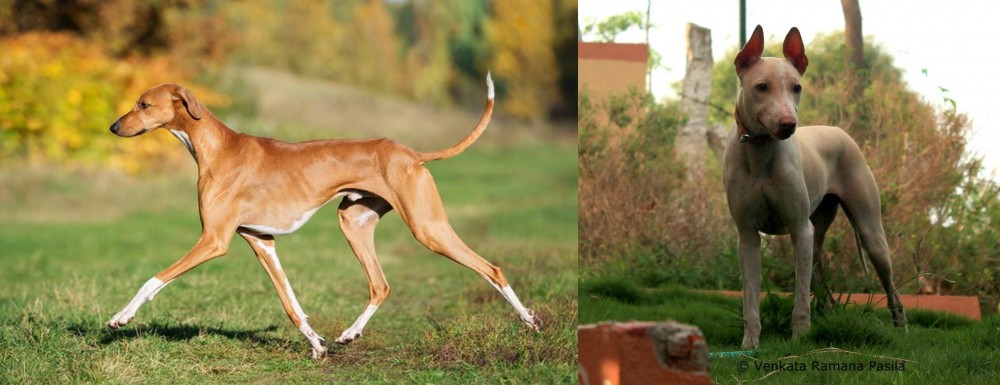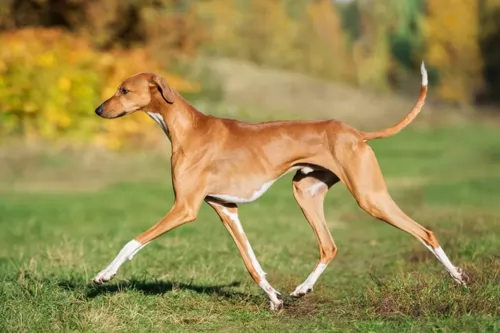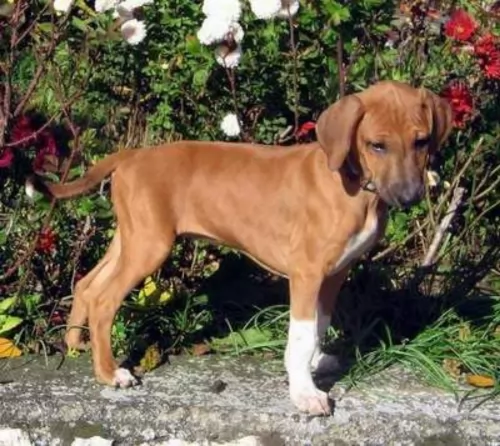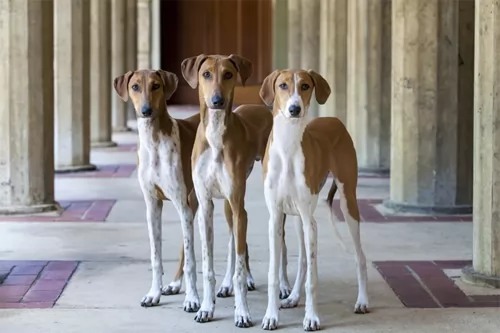 Petzlover
Petzlover Azawakh is originated from Mali but Jonangi is originated from India. Azawakh may grow 22 cm / 9 inches higher than Jonangi. Both Azawakh and Jonangi are having almost same weight. Both Azawakh and Jonangi has almost same life span. Both Azawakh and Jonangi has almost same litter size. Azawakh requires Moderate Maintenance. But Jonangi requires Low Maintenance
Azawakh is originated from Mali but Jonangi is originated from India. Azawakh may grow 22 cm / 9 inches higher than Jonangi. Both Azawakh and Jonangi are having almost same weight. Both Azawakh and Jonangi has almost same life span. Both Azawakh and Jonangi has almost same litter size. Azawakh requires Moderate Maintenance. But Jonangi requires Low Maintenance
 Azawakh dog was bred by the nomads in Africa. They were originally bred to be a guard dog. But, they realized that their body shape and bone structure allows them to run really fast (some say that they can run at the speed more than 65 km/h. This fact made them ideal for the hunting. Nowadays, they can be found across the globe but they are still very rare kind of a dog because they can survive and adapt to very high temperatures but they are very intolerant of low temperatures. Male Azawakh is slightly bigger than a female dog, with a greater instinct for guarding, hunting and taking care of the family and the pact.
Azawakh dog was bred by the nomads in Africa. They were originally bred to be a guard dog. But, they realized that their body shape and bone structure allows them to run really fast (some say that they can run at the speed more than 65 km/h. This fact made them ideal for the hunting. Nowadays, they can be found across the globe but they are still very rare kind of a dog because they can survive and adapt to very high temperatures but they are very intolerant of low temperatures. Male Azawakh is slightly bigger than a female dog, with a greater instinct for guarding, hunting and taking care of the family and the pact.
 The Jonangi, known also as the Jagilam or Kolleti Jagilam is an Indian breed of dog which has always been used for hunting and herding.
The Jonangi, known also as the Jagilam or Kolleti Jagilam is an Indian breed of dog which has always been used for hunting and herding.
The dog isn’t seen abundantly in India and it isn’t recognized by any major kennel clubs in India. It isn’t recognized as a pure” breed and there is also concern that the dog is reaching extinction.
Because of interbreeding with other dogs, there is quite a bit of variation in the Jonangi breed.
 Azawakh is a large dog breed placed in a family of the hounds. It looks almost like any hound we know – slim, with long and skinny legs, with a big-boned chest with a stomach placed up with the spine. They have thin and a bit longer tail, narrow nose and small skull in a triangle shape. Their body may look skinny but it is just the way they should look. Actually, you could probably see the bone structure of the adult Azawakh because they, like any other hounds, have specific muscles – very thin and flat. They can be found in many coat colours like sand, fawn or dark fawn, even brown. Their coat is very short, usually with white marks on the neck, chest and all four paws. In Africa, Azawakh can be found in a diversity of colours.
Azawakh is a large dog breed placed in a family of the hounds. It looks almost like any hound we know – slim, with long and skinny legs, with a big-boned chest with a stomach placed up with the spine. They have thin and a bit longer tail, narrow nose and small skull in a triangle shape. Their body may look skinny but it is just the way they should look. Actually, you could probably see the bone structure of the adult Azawakh because they, like any other hounds, have specific muscles – very thin and flat. They can be found in many coat colours like sand, fawn or dark fawn, even brown. Their coat is very short, usually with white marks on the neck, chest and all four paws. In Africa, Azawakh can be found in a diversity of colours.
 The Jonangi is a medium sized dog that stands between 43 – 53cm in height and weighs between 12 and 21kg. He is lean and muscular. Because of interbreeding with the Jonangi dog, the colors of their coats can vary and be anything from fawn, white, tan, black, bi-colored or even brindle. The coat is very short and fine which helps it cope with the extreme heat of the environment.
The Jonangi is a medium sized dog that stands between 43 – 53cm in height and weighs between 12 and 21kg. He is lean and muscular. Because of interbreeding with the Jonangi dog, the colors of their coats can vary and be anything from fawn, white, tan, black, bi-colored or even brindle. The coat is very short and fine which helps it cope with the extreme heat of the environment.
The ears are erect, the forehead is often wrinkled and the long tail is held out straight or it hangs down low. The ears are fairly short and are somewhat floppy.
The Jonangi is capable of being a true family pet, becoming loyal and devoted to his human family. This isn't a particularly intelligent dog but they're even tempered, fun loving, social and easy to please.
You'll find them getting on well with other pets in the home and children too. An interesting aspect with this dog is that he seems to like digging a hole and lying in it, even preferring this to the regular dog beds you get.
 Once Azawakh is a part of the family, he will try to find his place. If you teach him that you are the main figure, they will be obedient and affectionate pet. They love children, and they will surely be always close to them, guarding them and making sure they are safe.
Once Azawakh is a part of the family, he will try to find his place. If you teach him that you are the main figure, they will be obedient and affectionate pet. They love children, and they will surely be always close to them, guarding them and making sure they are safe.
canine freestyle sports, heelwork to music competitions.
If your Azawakh pet is trained well and socialized, they can fit in almost anywhere. Some will say that they hate cats, but there are some cases where they were raised with them and they did just fine. They will be quite tolerant of a stranger in your house. Since they get attached to the family, it is not recommendable to consider this breed as a new-owner kind of pet.
Once you set yourself as a pact leader, you will have almost no problems with training your dog various tricks. Azawakh is an intelligent breed, they learn quickly and they will be more than happy to show you every day what they have learned. It is necessary to start socializing your Azawakh dog while he is still a pup. They don’t respond well to harsh methods of teaching so you should really avoid them.
 Life with a Jonangi is easy going as these aren’t finicky dogs – they’re low maintenance, easy going, fairly healthy dogs that want to please you and just be your pet.
Life with a Jonangi is easy going as these aren’t finicky dogs – they’re low maintenance, easy going, fairly healthy dogs that want to please you and just be your pet.
They make excellent companions, being loving and loyal to their human families and getting on well with other dogs and children in the home.
There are those who are trying to revive the breed, and that is a good thing as these are good natured family pets that will be a positive addition to any home.
 The Azawakh breed is very rare and this kind of information cannot be still guaranteed. If they are bred with a healthy family, they are usually very healthy and don’t need much of the vet care. Some of the diseases that were found in a medical history of this magnificent dog report heart problems (usually caused by their super high need of daily activity), problems with the thyroid glands, and skin diseases caused by the increased secretion of the thyroid glands which causes their skin to become dry and in some cases even the loss of the hair.
The Azawakh breed is very rare and this kind of information cannot be still guaranteed. If they are bred with a healthy family, they are usually very healthy and don’t need much of the vet care. Some of the diseases that were found in a medical history of this magnificent dog report heart problems (usually caused by their super high need of daily activity), problems with the thyroid glands, and skin diseases caused by the increased secretion of the thyroid glands which causes their skin to become dry and in some cases even the loss of the hair.
 This dog is a robust breed, used to living under difficult circumstances. You won't find many inherited diseases with him, but still it pays to know about some of the more common dog illnesses that he might face.
This dog is a robust breed, used to living under difficult circumstances. You won't find many inherited diseases with him, but still it pays to know about some of the more common dog illnesses that he might face.
With any dog, the joints can take quite a pounding which can lead to injuries. You may notice your dog doing less and having difficulty with common activities. Your dog may even have lameness. Your vet will try to avoid surgery and look at things such as diet and weight management. There are also medications, anti-inflammatories and pain relievers.
Ear infections are common with dogs and can be caused by allergies, ear mites and bacteria in the ear canal. Your Jonangi may be tilting his head or shaking it, he may be constantly scratching his ear, he may even have lack of balance and an unpleasant odor coming from his ear because of a discharge. Take him to the vet as soon as you think he has an ear infection.
This problem which affects a dog’s lower urinary system can be totally debilitating for your dog. There are many problems which can cause this problem in your pet and which can lead to health conditions such as incontinence.
Older dogs and those with diabetes are more prone to urinary tract problems. Your dog will strain or yelp with discomfort when trying to pass urine. The urine may be very cloudy or even have blood in it and there may be dribbling of urine too. Other signs can be vomiting, lethargy, back pain, weight loss and change in appetite. See your veterinarian for immediate medical attention. It is considered a medical emergency.
 The Azawakh bred has a high risk of the obesity. They must be fed with special care since the food they eat can affect the thyroid glands function. They should never be overfed by average dry dog food. You will be advised to give them food with little percentage of the protein. They drink a lot of water and they like the dairy products. Their meals shouldn’t include fruits and vegetables, and some grains (millet, rice). They do not need to eat a lot of meat, but you can add some chicken in their meals.
The Azawakh bred has a high risk of the obesity. They must be fed with special care since the food they eat can affect the thyroid glands function. They should never be overfed by average dry dog food. You will be advised to give them food with little percentage of the protein. They drink a lot of water and they like the dairy products. Their meals shouldn’t include fruits and vegetables, and some grains (millet, rice). They do not need to eat a lot of meat, but you can add some chicken in their meals.
Puppies should be fed three times per day. Their portions should be small and diverse. Keep in mind to feed them at the same time each day because their metabolism will be formed by this. Adult dogs are fed two times per day, at the same time as well. After the meal, let them rest for an hour or two and never give them meals right after high physical activity.
If you want your Azawakh dog to be healthy and happy make sure you provide them with enough space to run, explore, dig holes and always have some fresh water. They don’t need regular vet checks, but if you notice some changes in their digestion, lower activity or skin abnormalities, it is very important to take them to the vet station. They should never be kept indoors, so if you are living this kind of life maybe this kind of dog is not for you. But, if you are super active and if you have a couple of hours per day to spend with your Azawakh, maybe you can make him feel a lot better.
Since they like the warmer climate, you can take them running with you. They will be a great companion while you bike and leave them leash free but only if he is trained to stay by your side. If you have a yard, make sure to leave some areas free for digging and hiding their special toys or treats. They are extremely playful and cheerful, so they will wander off in no time. Some of the Azawakh dogs were great on the hiking trips, so you can try this daily activity once you train him to listen to you.
 With commercially manufactured dog food, there are companies that make quality foods that are formulated for certain conditions such as joint health. They have additives in them such as fish oils which decrease inflammation. Always look for a food that is appropriate for your dog’s age and energy levels.
With commercially manufactured dog food, there are companies that make quality foods that are formulated for certain conditions such as joint health. They have additives in them such as fish oils which decrease inflammation. Always look for a food that is appropriate for your dog’s age and energy levels.
Add in your own home-made food to his dry kibble such as cooked chicken, brown rice and pasta as well as vegetables and also try to include some raw meat into his kibble from time to time. Fresh, cool water should be available to him night and day.
With his short coat, the dog is looked upon as low maintenance. Brush him a couple of times a week to make sure the coat remains shiny. Check his eyes, ears and teeth for infections.
This dog is lean, energetic and agile. With his long strides, he likes to run over terrain sniffing and following scents. He is more suited to life in the countryside than to the city. Make sure you have a reasonable sized garden for him and meet his exercise needs by taking him on walks and playing ball and fetch games with him.